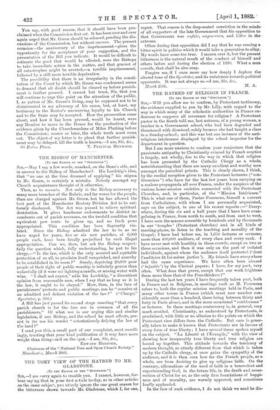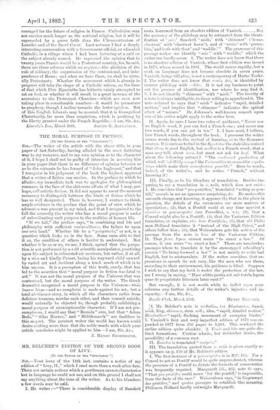THE HATRED OF RELIGION IN FRANCE.
[TO THE EDITOR OF THE "SPECTATOR']
Sia,—Will you allow me to confirm, by Protestant testimony, the evidence supplied to you by Mr. Lilly, with regard to the way in which many of the scholastic authorities in France en- deavour to suppress all reverence for religion ? A Protestant pastor in the South told me, last autumn, of a young woman, a teacher in a Government school, who had been degraded and threatened with dismissal, solely because she had taught a class in a Sunday-school ; and this was but one instance of the anti- religious intolerance displayed by the school inspector for the- department in question.
But I am more anxious to confirm your conjecture that the passionate antipathy to Christianity evinced by French sceptics is largely, not wholly, due to the way in which that religion has been presented by the Catholic Clergy as a whole, notwithstanding that there are many excellent and worthy men amongst the parochial priests. This is clearly shown, I think,. by the cordial reception given to the Protestant lecturers (" con- ferenciers ") who have for the last few years been carrying on a zealous propaganda all over France, under the auspices of the various home-mission societies connected with the Protestant Churches, and, in particular, of the "Mission Interieure." This is what one of them, Pastor Fourneau, himself a convert from Catholicism, with whom I am personally acquainted, says on the subject, in one of his recent reports :—" Every- where, during the six and a half years that I have been evan- gelising in France, from north to south, and from east to west, I have seen the masses assemble by hundreds and by thousands in our ' temples ' (Protestant churches) and in all kinds of meeting-places, to listen to the teaching and morality of the Gospel; I have had before me, in 1,650 lectures or sermons, more than 400,000 auditors, of every class and every rank. -I have never met with hostility in these crowds, except on two or three occasions, and then it was only on the part of isolated individuals, against whom the audience itself protested (‘ dont l'auditoire fit lui-mame justice '). My friends have everywhere had the same experience. We have often been abused (' injuries ') by the Clerical papers ; I have, for my part, very often. What does that prove, except that our work frightens them more than that of the Free-thinkers ?"
During the last ten years I have frequently taken part, both in France and in Belgium, in meetings such as M. Fourneau refers to, both the regular mission meetings held in Paris, and many other towns in France (which must now number con- siderably more than a hundred, there being between thirty and forty in Paris alone), and in the more occasional " conferences " or lectures. In these meetings controversy is, in general, very much avoided. Christianity, as understood by Protestants, is proclaimed, with little or no allusion to the points on which the Protestant view differs from the Catholic. But care is gener- ally taken to make it known that Protestants are in favour of every form of true liberty ; I have several times spoken myself on the subject. "La Liberte et l'Evangile," with the view of showing how inseparably true liberty and true religion are bound up together. This attitude towards the tendency of modern thought, so utterly different from that which is taken up by the Catholic clergy, at once gains the sympathy of the audience, and it is then seen how far the French people, as a whole, are from desiring to give up religious faith. On the contrary, affirmations of the need of faith in a benevolent and superintending God, in the future life, in the death and resur- rection of Christ for us, as the only firm foundations of happi- ness and of morality, are warmly approved, and sometimes loudly applauded.
In the face of such evidence, I do not think we need be die- eouraged for the future of religion in France. Catholicism may not survive much longer as the national religion, but it will be superseded by a purer faith than the Ultramontanism of Lourdes and of the Sacr4 Occur. Last autumn I had a deeply interesting conversation with a Government official, an educated Catholic, in a village where I had been lecturing at a cafe on the subject already named. He expressed the opinion that in twenty years France would be a Protestant country, for, he said, there are three reforms which we require,—the abolition of the rule of celibacy, the suppression of the confessional, and inde- pendence of Rome; and when we have these, we shall be virtu- ally Protestants. Whether the movement which is already in progress will take the shape of a Catholic reform, on the lines -of that which Pere Hyacinthe has hitherto vainly attempted to set on foot, or whether it will result in a great increase of the accessions to the Protestant Churches—which are even now taking place in considerable numbers—it would be premature to prophesy, though I incline towards the latter opinion. But -of this English Liberals may be assured, that it is Evangelical Christianity, far more than scepticism, which is profiting by -the liberty granted under the French Republic.--I am, Sir, &c.,















































 Previous page
Previous page